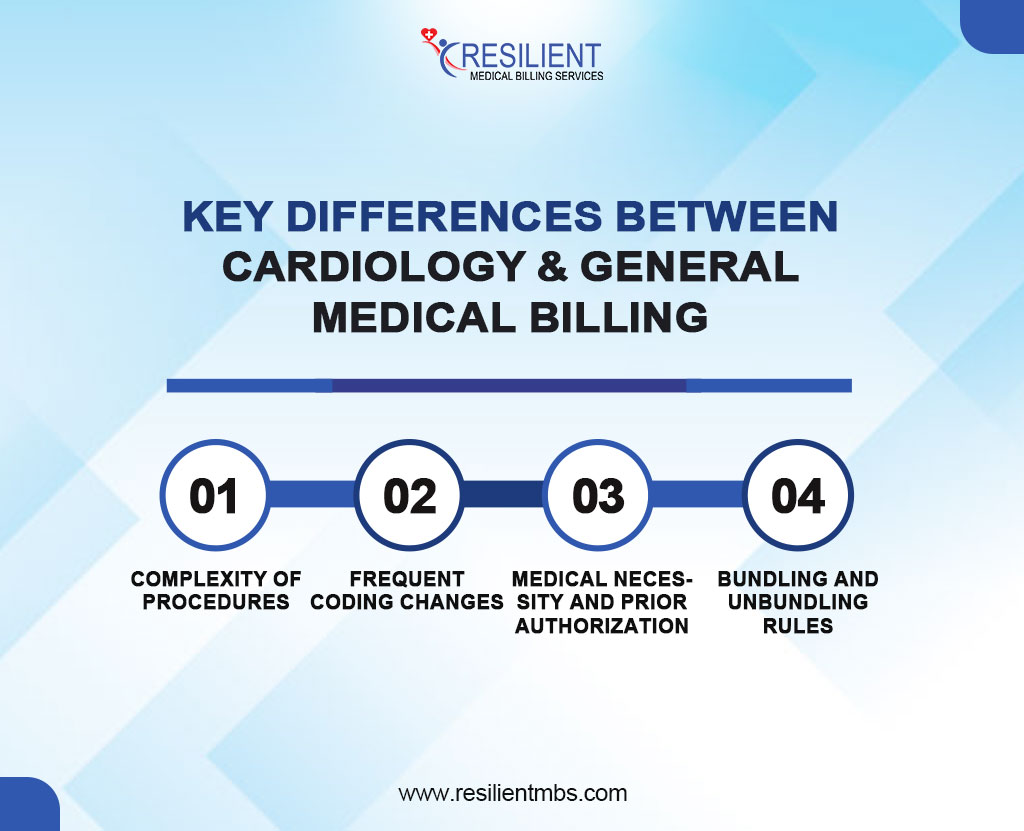Cardiology billing keeps cardiology practices afloat by getting life-saving therapies reimbursed. Cardiology treatments cost roughly $555 billion in U.S. healthcare spending annually, therefore correct billing and coding are essential to maintaining a revenue cycle and avoiding claim denials.
The importance of precise coding goes beyond financial health to compliance. AMA says almost 30% of medical claim denials are attributable to coding errors, resulting in revenue loss and administrative hassles. Correct cardiac CPT codes decrease billing errors, reducing audits and financial penalties.
Billing of cardiology is notoriously complicated. System navigation is difficult due to frequent coding revisions, payer policy variances, and complex procedural classifications. Clinicians and billing personnel must follow regulatory changes, use technology, and follow best practices to enhance cardiac medical billing efficiency and compliance.
This blog will cover cardiology medical billing‘s important CPT codes and ways to maximize income and compliance. Understanding these key factors can assist providers, billers, and administrators speed the process and reduce claim denials.
Jump in!
The Basics of Cardiology Billing
Through Cardiology billing Healthcare workers file claims for heart-related surgeries and services. It means correctly recording and translating medical treatments into codes that can be reimbursed by insurance.
Billing of cardiology is essential to healthcare revenue cycle cash flow and financial sustainability. Correct billing helps cardiologists avoid claim denials and compliance concerns and be paid on time.
Differences Between Cardiology Medical Billing and General Medical Billing
While general medical billing covers a wide range of healthcare services, cardiology medical billing is specialized and requires in-depth knowledge of cardiovascular procedures.
Some key differences include:
- Complexity of Procedures
- Frequent Coding Changes
- Medical Necessity and Prior Authorization
- Bundling and Unbundling Rules
Key CPT Codes for Cardiology Procedures
93000 – Electrocardiogram (ECG) with interpretation and report
93306 – Transthoracic echocardiography with Doppler and color flow
93458 – Coronary angiography with catheter placement
92920 – Percutaneous transluminal coronary angioplasty (PTCA)
33208 – Insertion of a pacemaker system
93620 – Electrophysiologic evaluation with pacing and recording
Importance of Accurate Cardiology CPT Codes in Cardiology Billing
Correct coding for cardiology is important for getting claims approved and preventing rejections. Mistakes can cause revenue problems, audits, or safety concerns. Important factors are:
- Precise Procedure Coding
Each cardiology service, from diagnostics to interventions, has specific CPT codes that must be correctly assigned.
- Insurance Compliance
Payers have strict billing guidelines, and incorrect codes can result in claim rejections.
- Optimized Reimbursement
Accurate coding ensures cardiologists receive appropriate payment while adhering to healthcare regulations.
Key Strategies to Prevent Frequent Claim Denials and How to Avoid Them
Cardiology billing frequently gets denied because of wrong coding, not enough supporting documents, and missing previous approvals. Here are some important ways to reduce denials:
- Using precise CPT and ICD-10 codes that match the diagnosis
- Ensuring thorough documentation of procedures and medical necessity.
- Verifying patient insurance coverage and pre-authorization requirements.
- Importance of Documentation in Cardiology Medical coding.
- Proper documentation is crucial for accurate reimbursement.
Essential Components of an Efficient Cardiology Billing System
The performance of an efficient billing system leads to precise claims processing while decreasing denials and producing optimal returns. Here are the key components:
Accurate Coding & Compliance
Modern CPT codes alongside ICD-10 and HCPCS specific to cardiology help prevent rejected claims while developing insurance rule compliance.
Specialized Billing Software
The functionality of a modern medical billing system includes automatic claim processing which detects errors and interacts with EHR programs to deliver both precision and operational efficiency.
Claims Management & Denial Prevention
Timely claim monitoring procedures and fast payment submissions together with proactive denial monitoring help minimize revenue loss while boosting financial operational efficiency.
Credentialing & Payer Enrollment
Medical reimbursement remains smooth when cardiologists include major insurer credentialing because it prevents payment delays.
Comprehensive Patient Documentation
The combination of thorough patient documentation which includes all treatment and physician notes results in correct billing while decreasing potential audit vulnerabilities.
Revenue Cycle Management (RCM) Optimization
The implementation of an optimized RCM process enables cardiology practices to obtain faster claim approvals and obtain faster payments that lead to stable finances.
Challenges in Cardiology Billing

- Complex Coding – Extensive use of CPT, ICD-10, and HCPCS codes for different procedures.
- Regular Coding Updates – Billing codes change often, so you need to keep learning.
- Pre-Authorization Requirements – Many heart procedures need permission beforehand, which can cause delays.
- Claim Denials & Rejections – Many claims are denied because of mistakes in code or problems with the paperwork.
- Insurance differences – Various payer rules lead to uneven payments.
- Bundling and Unbundling Problems – There’s a risk of wrong bills because the rules for combining services are complicated.
- Medical Necessity Documentation – Insurance companies usually need clear reasons for medical treatments.
- Compliance Risks – Not following strict rules and audits can result in fines.
- Reimbursement delays can slow down cash flow and affect how money comes in.
- Patient Billing Challenges – High out-of-pocket prices lead to collection problems.
Professional Cardiology Billing Services Improve Accuracy and Efficiency
Outsourcing billing of cardiology to experts improves accuracy and efficiency. Billing specialists maintain abreast of coding changes and payer policies to submit accurate claims. This simplifies administrative tasks and speeds claim processing, letting physicians focus on patient care. Best processes and advanced software reduce errors, denials, and reimbursements. Professional billing services also comply with healthcare standards, reducing audits and penalties.
Final Words!
Providers must have exact cardiology billing procedures that enable financial stability while meeting industry requirements. Your ability to stay updated with payer rules combined with the selection of proper cardiac CPT codes alongside best practice protocol supports quicker payment approval and higher revenue.
Strategies that enhance billing of cardiology through internal improvements or revenue cycle management organizations require frequent proactive oversight from healthcare providers.
To achieve successful cardiology billing operations practitioners need both expertise alongside detailed precision and active adherence to evolving requirements. Your cardiology billing process becomes smoother through the services provided by Resilient MBS which will help you generate more revenue.
Contact Resilient MBS today to understand how their experts can optimize your revenue cycle, eliminate claim denials, and maintain cardiac medical billing compliance.









